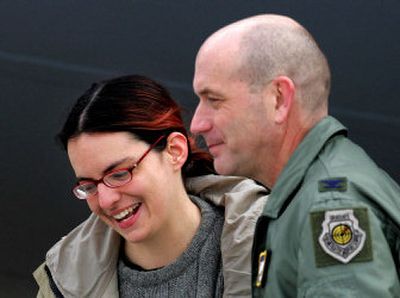Freed reporter sets the record straight

RAMSTEIN AIR BASE, Germany – Protected by the U.S. military and far from the country where she had been held hostage, Jill Carroll strongly disavowed statements she had made during captivity in Iraq and shortly after her release, saying Saturday she had been repeatedly threatened.
In a video recorded before she was freed and posted by her captors on an Islamist Web site, Carroll spoke out against the U.S. military presence. But in a statement Saturday, she said the recording was made under threat. Her editor has said three men were pointing guns at her at the time.
“During my last night in captivity, my captors forced me to participate in a propaganda video. They told me I would be released if I cooperated. I was living in a threatening environment, under their control, and wanted to go home alive. So I agreed,” she said in a statement read by her editor in Boston.
“Things that I was forced to say while captive are now being taken by some as an accurate reflection of my personal views. They are not.”
Carroll arrived in Germany on Saturday on a U.S. military transport plane on her way back to the United States and was expected in Boston today. The Islamic headscarf she wore as a hostage was gone, and she instead wore jeans and a gray sweater.
The 28-year-old journalist – a freelancer for the Boston-based Christian Science Monitor – was seized Jan. 7 in western Baghdad by gunmen who killed her Iraqi translator. She was dropped off Thursday – 82 days later – at an office of the Iraqi Islamic Party, a Sunni Arab organization, and later escorted by the U.S. military to the Green Zone, the fortified compound in Baghdad protecting the U.S. Embassy and other facilities.
In the statement, Carroll also disavowed an interview she gave to the party shortly after her release. She said the party had promised her the interview would not be aired “and broke their word.”
“At any rate, fearing retribution from my captors, I did not speak freely. Out of fear I said I wasn’t threatened. In fact, I was threatened many times,” she said. “Also, at least two false statements about me have been widely aired: One – that I refused to travel and cooperate with the U.S. military, and two – that I refused to discuss my captivity with U.S. officials. Again, neither statement is true.”
The remarks have drawn criticism from conservative bloggers and commentators, but the Monitor said “Carroll did what many hostage experts and past captives would have urged her to do: Give the men who held the power of life and death over her what they wanted.”
Carroll has said her kidnappers confined her to a small, soundproof room with frosted, opaque windows.
Aside from the short interview aired on Iraqi television upon her release, Carroll had otherwise not shown herself in public prior to her brief appearance Saturday.
The kidnappers, calling themselves the Revenge Brigades, had demanded the release of all female detainees in Iraq by Feb. 26 or Carroll would be killed. U.S. officials did release some female detainees at the time, but said it had nothing to do with the demands.